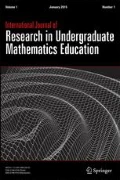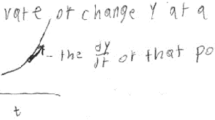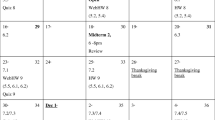Abstract
In this instrumental case study, we examined the ways in which one mathematician’s instruction unfolded during his participation in a faculty collaboration geared towards reforming instruction. In the study, we offer the case as both the participant’s collaborative experience in an online faculty collaboration and his implementation of an inquiry oriented differential equations curriculum at the same time. The faculty collaboration specifically focused on reforming instruction to align with inquiry oriented instruction. Data analyzed for the case study included recordings of the weekly faculty collaborations, video observations of the participant’s instruction over a full semester, and interviews that focused on the participant’s perspective of his experiences. Results indicated the participant was very capable of eliciting student ways of reasoning and other student contributions from his class but he less often actively inquired into their thinking. This was either because he had already anticipated their thinking, or was not attentive to it because his mathematical opinion took precedence in his thinking over that of his students. Further, results indicated that from the participant’s perspective, the online faculty collaboration supported him in his instructional reform endeavors by providing him language to define his instruction. It also provided him avenues to engage in pedagogical discussions and experience, through the other participants, different ways students thought about differential equations.


Similar content being viewed by others
Notes
The IODE Curriculum is available at https://iode.wordpress.ncsu.edu.
References
Blanchard, P. (1994). Teaching differential equations with a dynamical systems viewpoint. The College Mathematics Journal, 25(5), 385–393.
Borko, H., Jacobs, J. K., Eiteljorg, E., & Pittman, M. E. (2008). Video as a tool for fostering productive discussions in mathematics professional development. Teaching and Teacher Education, 24(2), 417–436.
Borrego, M., & Henderson, C. (2014). Increasing the use of evidence-based teaching in STEM higher education: A comparison of eight change strategies. Journal of Engineering Education, 103(2), 220–252. https://doi.org/10.1002/jee.20040.
Bressoud, D. M., Carlson, M. P., Mesa, V., & Rasmussen, C. (2013). The calculus student: Insights from the mathematical Association of America national study. International Journal of Mathematical Education in Science and Technology, 44(5), 685–698. https://doi.org/10.1080/0020739X.2013.798874.
Bressoud, D. M., Mesa, V., & Rasmussen, C. (Eds.). (2015). Insights and recommendations from the MAA: National study of college calculus. Washington, DC: MAA.
Coburn, C. E., Russell, J. L., Kaufman, J. H., & Stein, M. K. (2012). Supporting sustainability: Teachers’ advice networks and ambitious instructional reform. American Journal of Education, 119(1), 137–182.
Creswell, J. W. (2013). Qualitative inquiry and research design: Choosing among five approaches (3rd ed.). Thousand Oaks, CA: Sage.
Dancy, M. H., & Henderson, C. (2010). Pedagogical practices and instructional change of physics faculty. American Journal of Physics, 78(10), 1056–1063. https://doi.org/10.1119/1.3446763.
Demir, K., Czerniak, C. M., & Hart, L. C. (2013). Implementing Japanese lesson study in a higher education context. Journal of College Science Teaching, 42(4), 22–27.
Desimone, L. M., Porter, A. C., Garet, M. S., Yoon, K. S., & Birman, B. F. (2002). Effects of professional development on teachers’ instruction: Results from a three- year longitudinal study. Educational Evaluation and Policy Analysis, 24(2), 81–112. https://doi.org/10.3102/01623737024002081.
Dyer, E. B., & Sherin, M. G. (2016). Instructional reasoning about interpretations of student thinking that supports responsive teaching in secondary mathematics. ZDM - International Journal on Mathematics Education, 48(1–2), 69–82.
Freeman, S., Eddy, S. L., McDonough, M., Smith, M. K., Okoroafor, N., Jordt, H., & Wenderoth, M. P. (2014). Active learning increases student performance in science, engineering, and mathematics. Proceedings of the National Academy of Sciences, 111(23), 8410–8415. https://doi.org/10.1073/pnas.1319030111.
Freudenthal, H. (1991). Revisiting mathematics education. Dordrecht, Netherlands: Kluwer Academic Publishers.
Fukawa-Connelly, T. (2012). A case study of one instructor’s lecture-based teaching of proof in abstract algebra: Making sense of her pedagogical moves. Educational Studies in Mathematics, 81, 325–345.
Fukawa-Connelly, T., Johnson, E., & Keller, R. (2016a). Can math education research improve the teaching of abstract algebra ? Notices of the American Mathematical Society, 63(3), 276–281.
Fukawa-Connelly, T., Johnson, E., & Keller, R. (2016b). Results from a national survey of abstract algebra instructors: Math ed is solving problems they don’t have. In Proceedings of the 19th Annual Conference on Research in Undergraduate Mathematics Education. Pittsburgh: West Virginia University.
Gormally, C., Evans, M., & Brickman, P. (2014). Feedback about teaching in higher ed: Neglected opportunities to promote change. CBE-Life Sciences Education, 13(2), 187–199. https://doi.org/10.1187/cbe.13-12-0235.
Hayward, C. N., & Laursen, S. L. (2016). Helping instructors to adopt research-supported techniques: Lessons from IBL workshops. In T. Fukawa-Connelly, N. Infante, M. Wawro, & S. Brown (Eds.), Proceedings of the 19th annual conference on research in undergraduate mathematics education. Pittsburgh: West Virginia University.
Hayward, C. N., Kogan, M., & Laursen, S. L. (2015). Facilitating instructor adoption of inquiry-based learning in college mathematics. International Journal of Research in Undergraduate Mathematics Education, 2(1), 59–82.
Henderson, C. (2005). The challenges of instructional change under the best of circumstances: A case study of one college physics instructor. American Journal of Physics, 73(8), 778. https://doi.org/10.1119/1.1927547.
Henderson, C., & Dancy, M. H. (2007). Barriers to the use of research-based instructional strategies: The influence of both individual and situational characteristics. Physical Review Special Topics - Physics Education Research, 3(2), 1–14. https://doi.org/10.1103/PhysRevSTPER.3.020102.
Henderson, C., Beach, A., & Finkelstein, N. (2011). Facilitating change in undergraduate STEM instructional practices: An analytic review of the literature. Journal of Research in Science Teaching, 48(8), 952–984.
Henderson, C., Dancy, M. H., & Niewiadomska-Bugaj, M. (2012). Use of research-based instructional strategies in introductory physics: Where do faculty leave the innovation-decision process? Physical Review Special Topics - Physics Education Research, 8(2), 1–15. https://doi.org/10.1103/PhysRevSTPER.8.020104.
Jaworski, B., Mali, A., & Petropoulou, G. (2017). Critical theorising from studies of undergraduate mathematics teaching for students’ meaning making in mathematics. International Journal of Research in Undergraduate Mathematics Education, 3(1), 168–197.
Johnson, E. (2013). Teachers’ mathematical activity in inquiry-oriented instruction. Journal of Mathematical Behavior, 32(4), 761–775. https://doi.org/10.1016/j.jmathb.2013.03.002.
Johnson, E., & Larsen, S. (2012). Teacher listening: The role of knowledge of content and students. Journal of Mathematical Behavior, 31(1), 117–129. https://doi.org/10.1016/j.jmathb.2011.07.003.
Kania, J., & Kramer, M. (2011). Collective impact. Stanford Social Innovation Review.
Kensington-Miller, B., Sneddon, J., & Stewart, S. (2014). Crossing new uncharted territory: Shifts in academic identity as a result of modifying teaching practice in undergraduate mathematics. International Journal of Mathematical Education in Science and Technology, 45(6), 827–838.
Knoblauch, H., Tuma, R., & Schnettler, B. (2014). Video analysis and videography. In U. Flick (Ed.), The SAGE handbook of qualitative data analysis. London: Sage. https://doi.org/10.4135/9781446282243.
Kogan, M., & Laursen, S. L. (2012). Role of faculty professional development in improving undergraduate mathematics education: The case of IBL workshops. In S. Brown, S. L. Laursen, K. Marrongelle, & M. Oehrtman (Eds.), Proceedings of the 15th annual conference on research in undergraduate mathematics education (pp. 80–87). Portland: Portland State University.
Kuster, G., Johnson, E., Keene, K. A., & Andrews-Larson, C. (2018). Inquiry-oriented instruction: A conceptualization of the instructional the components and practices. PRIMUS, 28(1), 13–30.
Kuster, G., Johnson, E., Rupnow, R., & Wilhelm, A. (2019). The inquiry-oriented instructional measure. International Journal for Research in Undergraduate Mathematics Education. Published online first https://link.springer.com/article/10.1007/s40753-019-00089-2.
Kwon, O. N., Rasmussen, C., & Allen, K. (2005). Students’ retention of mathematical knowledge and skills in differential equations. School Science and Mathematics, 105(5), 227–240. https://doi.org/10.1111/j.1949-8594.2005.tb18163.x.
Larsen, S., Glover, E., & Melhuish, K. (2015). Beyond good teaching: The benefits and challenges of implementing ambitious teaching. In D. M. Bressoud, V. Mesa, & C. Rasmussen (Eds.), Insights and recommendations from the MAA: National study of college calculus (pp. 93–105). Washington: MAA.
Laursen, S. (2016). Organizational features that influence departments’ uptake of student-centered instruction: Case studies from inquiry-based learning in college mathematics. In T. Fukawa-Connelly, N. Infante, M. Wawro, & S. Brown (Eds.), Proceedings of the 19th annual conference on research in undergraduate mathematics education. Pittsburgh: West Virginia University.
Laursen, S., & Rasmussen, C. (2019). I on the prize: Inquiry approaches in undergraduate mathematics. International Journal of Research in Undergraduate Mathematics Education, 5(1), 129–146. https://doi.org/10.1007/s40753-019-00085-6.
Lewis, C. C., Perry, R. R., & Hurd, J. (2009). Improving mathematics instruction through lesson study: A theoretical model and north American case. Journal of Mathematics Teacher Education, 12(4), 285–304.
Lewis, C. C., Perry, R. R., & Friedkin, S. (2011). Using Japanese curriculum materials to support lesson study outside Japan: Toward coherent curriculum. Educational Studies in Japan: International Yearbook, 6, 5–19.
Mathematical Association of America. (2011). Partner discipline recommendations for introductory college mathematics and the implications for college algebra. (S. L. Ganter & W. E. Haver, Eds.). Washington, DC: Author. Retrieved from http://www.maa.org/sites/default/files/pdf/CUPM/crafty/introreport.pdf
Mathematical Association of America. (2015). A common vision for undergraduate mathematical sciences programs in 2025. (K. Saxe & L. Braddy, Eds.). Washington, DC: Author. Retrieved from http://www.maa.org/sites/default/files/pdf/CommonVisionFinal.pdf
McDuffie, A. R., & Graeber, A. O. (2003). Institutional norms and policies that influence college mathematics professors in the process of changing to reform-based practices. School Science and Mathematics, 103(7), 331–344.
Mehan, H. (1979). Learning lessons. Cambridge: Harvard University Press.
Mesa, V., Celis, S., & Lande, E. (2014). Teaching approaches of community college mathematics faculty: Do they relate to classroom practices? American Educational Research Journal, 51(1), 117–151.
Mesa, V., Burn, H., & White, N. (2015). Good teaching of Calculus I. In D. M. Bressoud, V. Mesa, & C. Rasmussen (Eds.), Insights and recommendations from the MAA: National study of college calculus (pp. 83–91). Washington: MAA.
Nadelson, L. S., Shadle, S. E., & Hettinger, J. K. (2013). A journey toward mastery teaching: STEM faculty engagement in a year-long faculty learning community. Learning Communities Journal, 5, 97–122.
National Research Council. (2000). How people learn. Washington: National Academy Press.
National Research Council. (2001). Adding it up: Helping children learn mathematics. Washington, DC: National Academy Press.
National Research Council. (2013). The mathematical sciences in 2025. Washington: National Academy Press.
Paterson, J., Thomas, M., & Taylor, S. (2011). Decisions, decisions, decisions: What determines the path taken in lectures? International Journal of Mathematical Education in Science and Technology, 42(7), 985–995.
Perry, R. R., & Lewis, C. C. (2009). What is successful adaptation of lesson study in the US? Journal of Educational Change, 10(4), 365–391. https://doi.org/10.1007/s10833-008-9069-7.
President’s Council of Advisors on Science and Technology. (2012). Engage to excel: Producing one million additional college graduates with degrees in science, technology, engineering, and mathematics. Washington: White House Office of Science and Technology Policy Retrieved from www.whitehouse.gov/administration/eop/ostp/pcast/docsreports.
Rasmussen, C., & Keynes, M. (2003). Lines of eigenvectors and solutions to systems of linear differential equations. PRIMUS, 8(4), 308–320.
Rasmussen, C., & Marrongelle, K. (2006). Pedagogical content tools: Integrating student reasoning and mathematics in instruction. Journal for Research in Mathematics Education, 37(5), 388–420.
Rasmussen, C., & Kwon, O. N. (2007). An inquiry-oriented approach to undergraduate mathematics. Journal of Mathematical Behavior, 26(3), 189–194.
Rasmussen, C., Zandieh, M., King, K., & Teppo, A. (2005). Advancing mathematical activity: A practice-oriented view of advanced mathematical thinking. Mathematical Thinking and Learning, 7(1), 51–73. https://doi.org/10.1207/s15327833mtl0701_4.
Rasmussen, C., Kwon, O. N., Allen, K., Marrongelle, K., & Burtch, M. (2006). Capitalizing on advances in mathematics and K-12 mathematics education in undergraduate mathematics: An inquiry-oriented approach to differential equations. Asia Pacific Education Review, 7(1), 85–93.
Rasmussen, C., Keene, K. A., Dunmyre, J., & Fortune, N. (2018). Inquiry oriented differential equations: Course materials. Available at https://iode.wordpress.ncsu.edu
Sherin, M. G., & van Es, E. A. (2009). Effects of video club participation on teachers’ professional vision. Journal of Teacher Education, 60(1), 20–37.
Smith, M. S., & Stein, M. K. (1998). Selecting and creating mathematical tasks: From research to practice. Mathematics Teaching in the Middle School, 3(5), 344–350.
Speer, N. M., & Wagner, J. F. (2009). Knowledge needed by a teacher to provide analytic scaffolding during undergraduate mathematics classroom discussions. Journal for Research in Mathematics Education, 40(5), 530–562. https://doi.org/10.2307/40539355.
Speer, N. M., Smith, J. P., & Horvath, A. (2010). Collegiate mathematics teaching: An unexamined practice. Journal of Mathematical Behavior, 29(2), 99–114.
Stake, R. E. (1995). The art of case study research. Thousand Oaks: Sage.
Stigler, J. W., & Hiebert, J. (2004). Improving mathematics teaching: The 1999 TIMSS video study. Educational Leadership, 61(5), 12–17.
Strauss, A. L., & Corbin, J. M. (1998). Basics of qualitative research: Techniques and procedures for developing grounded theory (2nd ed.). Thousand Oaks: Sage.
Theobald, E. J., Hill, M. J., Tran, E., Agrawal, S., Arroyo, E. N., Behling, S., Chambwe, N., Cintrón, D. L., Cooper, J. D., Dunster, G., Grummer, J. A., Hennessey, K., Hsiao, J., Iranon, N., Jones, L., Jordt, H., Keller, M., Lacey, M. E., Littlefield, C. E., … Freeman, S. (2020). Active learning narrows achievement gaps for underrepresented students in undergraduate science, technology, engineering, and math. Proceedings of the National Academy of Sciences, 117(12), 6476–6483. https://doi.org/10.1073/pnas.1916903117.
van Es, E. A., Tunney, J., Goldsmith, L. T., & Seago, N. (2014). A framework for the facilitation of teachers’ analysis of video. Journal of Teacher Education, 65(4), 340–356. https://doi.org/10.1177/0022487114534266.
Wagner, J. F., Speer, N. M., & Rossa, B. (2007). Beyond mathematical content knowledge: A mathematician’s knowledge needed for teaching an inquiry-oriented differential equations course. Journal of Mathematical Behavior, 26(3), 247–266. https://doi.org/10.1016/j.jmathb.2007.09.002.
Walczyk, J. J., Ramsey, L. L., & Zha, P. (2007). Obstacles to instructional innovation according to college science and mathematics faculty. Journal of Research in Science Teaching, 44(1), 85–106.
Wieman, C., Deslauriers, L., & Gilley, B. (2013). Use of research-based instructional strategies: How to avoid faculty quitting. Physical Review Special Topics - Physics Education Research, 9(2), 1–5.
Yin, R. (2013). Case study research: Design and methods (5th ed.). Thousand Oaks: Sage.
Acknowledgements
This work was supported by the Teaching Inquiry-oriented Mathematics: Establishing Supports project, funded by the National Science Foundation (DUE #1431641). The opinions in this manuscript are our own, and do not necessarily reflect the views of the National Science Foundation. The authors would like to thank the reviewers of earlier versions of this manuscript, as well as, Mike Steele, Kate Raymond, Molly Williams, and Naomi Jessup for their helpful feedback.
Data Avialability
Data is protected by IRB but deidentified data is available upon request.
Code Availability
Not applicable.
Funding
This work was supported by the National Science Foundation (DUE #1431641).
Author information
Authors and Affiliations
Corresponding author
Ethics declarations
Conflicts of Interest / Competing Interests
The authors have no conflicts of interest nor competing interests.
Additional information
Publisher’s Note
Springer Nature remains neutral with regard to jurisdictional claims in published maps and institutional affiliations.
Rights and permissions
About this article
Cite this article
Fortune, N., Keene, K.A. Participating in an Online Working Group and Reforming Instruction: the Case of Dr. DM. Int. J. Res. Undergrad. Math. Ed. 7, 107–139 (2021). https://doi.org/10.1007/s40753-020-00126-5
Accepted:
Published:
Issue Date:
DOI: https://doi.org/10.1007/s40753-020-00126-5




